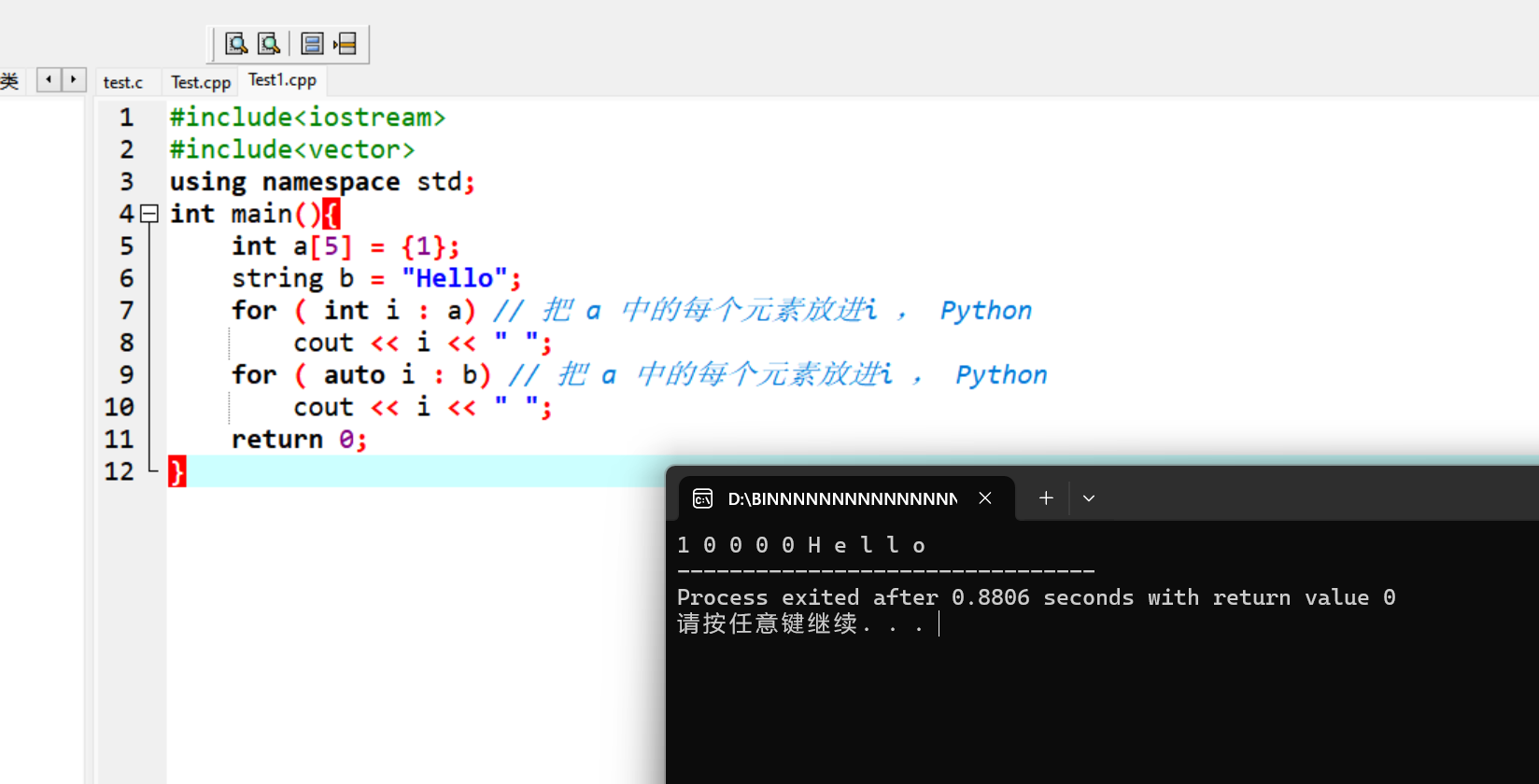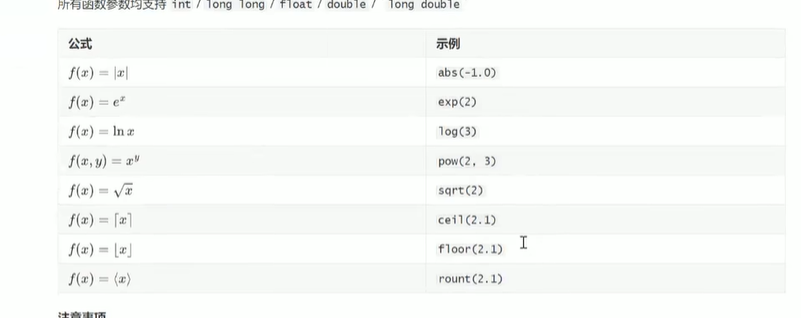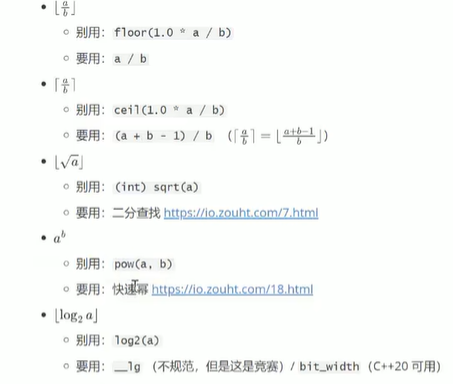C++
C++一、C++初识1、Hello World2、string类3、结构体4、引用与传参二、STL1、vector(可变数组)(list)2、set(集合) (自动排序的turple)3、map (键值对)(dict)4、stack(栈)5、queue(队列)6、unordered_map unordered_set (无序的键值对和无序的集合)三、位运算四、sort函数五、cctype六、For循环七、算法库1、swap() 交换算法2、sort() 算法3、lower_bound() / upper_bound() (二分查找)4、reverse() (反转)5、max() , min() 最大值最小值6、unique() 去重(结合earse)7、数学函数8、gcd() lcm() 最大公因数,最小公倍数
一、C++初识
1、Hello World
#include<iostream>
using namespace std;
int main(void){
int n;
cin >> n; // cin 相当于scanf
cout << "Hello World" << n++ << endl; // cout 相当于printf endl相当于\n
return 0;
}
如果没有using namespace std ,那么下面封装的方法需要用 std::cout 来使用
2、string类
我了个面向对象编程啊,看来之前学的Python没白学
#include<string>
string s1 = "Hello";
string s2 = "World";
string s3 = s1 + S2;
cin >> s; // 获取
cout << s << endl;
s3.push_back('!'); // 增删
s3.pop_back();
s3.insert(5,' fucking ');
cout
getline(cin,s); // 获取一整行
cout << s <<endl;
cout << s.lenth() <<endl;
// s1 = s.substr(n,m); 从第n个字符开始,取后面的m个字符
// s1 = s.substr(n); 把第n个及以后的所有字符全部拷贝
string s_sub = s.substr();
string s = to_string(123.1); // 将数据转化为字符串
int a = stoi("123"); // string to int
double b = stod("123.4"); // string to double
3、结构体
C语言可以省去struct
struct stu{
string name;
int age;
};
stu a[10];
4、引用与传参
#include<isostream>
suing namespace std;
// &a相当于指针,主函数的a被改变
void c(int &a){
a+=1;
}
// a 是形参,主函数a不变
void c(int a){
a+=1;
}
int main(void){
int a = 4;
c(a);
cout << a << endl;
return 0;
}
二、STL
1、vector(可变数组)(list)
#include<isostream>
#include<vector>
suing namespace std;
int main(void){
vector <int> v;
vector <int> v(10,2); // 分配了10个空间,每个空间填上2
vector <int> v(10); // 等价于全填 0
v.resize(10); // 分配十个空间,默认也填0
for (int i = 0;i<10;i++){
v[i] = i;
}
for (int i = 0;i<10;i++){
cout << v[i] << " "
}
v.push_back(11); // 加入一个11
// 迭代器,自动把vector内的所有元素迭代一遍,上面的for循环执行十次就停了
for (auto p = v.begin();p!=v.end();p++) // v.end() 实际上是指向最后一个元素的下一个位置的指针,p是一个指针
cout << *p << " ";
vector <int> numbers = {10,20,30,40};
vector<int>::iterator it = numbers.begin(); // 使用迭代器删去“30”
it += 2;
numbers.erase(it);
for(int num:numbers){
cout << num << endl;
}
it = numbers.begin();
it ++;
numbers.insert(it , 25); // 在下标为1的地方插入一个25
return 0;
}
2、set(集合) (自动排序的turple)
特点:元素互异,且元素会从小到大排序
#include<isostream>
#include<set>
using namespace std;
int main(void){
set <int> a;
s.insert(1);
s.insert(2);
s.insert(3);
cout << (s.find(2) != s.end()) << endl; // s.find() 返回的是一个指针,没有找到返回的就是s.end()
cout << (s.find(4) != s.end()) << endl;
s.erase(1); // 删除
return 0;
}
3、map (键值对)(dict)
map是键值对,它会自动将所有的键值对按照键从小到大排序
#include<isostream>
#include<map>
using namespace std;
int main(void){
map <string,int> m;
// 添加
m["hello"] = 2; // 排序是按照键的ASCII吗排序的
m["world"] = 3;
// 访问
cout << "hello:" << m["hello"];
// 遍历
for(auto p = m.begin(); p != m.end();p++){
cout << p->first << ":" << p->second << endl; // p是结构指针了,p->first是结构里的键,p->second是结构里的值
}
// 所有的容器都可以用.size() 方法获取长度
return 0;
}
4、stack(栈)
不可遍历,先入后出
#include<isostream>
#include<stack>
using namespace std;
int main{
stack <int> s;
s.push(1);
s.push(2);
pop = s.pop();
cout << s.top() << endl;
cout << s.size() << endl;
return 0;
}
5、queue(队列)
不可遍历,先入先出
#include<isostream>
#include<queue>
using namespace std;
int main{
queue <int> s;
s.push(1);
s.push(2);
// 访问队首
cout << s.front() << endl;
// 访问队尾
cout << s.back() << endl;
// pop
s_pop = s.pop();
return 0;
}
6、unordered_map unordered_set (无序的键值对和无序的集合)
省去了排序的过程,如果时间超时就可以用这俩
三、位运算
bitset类似一个字符数组,但是是从二进制的低位到高位排序,按照b[i]和b的输出方式截然相反
10010 b[0] = 0
#include<isostream>
#include<bitset>
using namespace std;
int main{
bitset <5> b; // 五个二进制位,初始为0
bitset <5> b (19);// 最多为5位
bitset <8> c ("1101"); // 00001101 前面都补0
bitset <5> b(s,pos,n); // 从字符串s[pos]开始,n位长度(包括本位)
cout << b << endl;
for (int i = 0;i < b.size();i++){
cout << b[i] << endl;
}
//操作
cout << "是否有1:" << b.any() << endl;
cout << "是否不存在1:" << b.none() << endl;
cout << "1的个数:" << b.count() << endl;
cout << "b中元素个数:" << b.size() << endl;
cout << "下标为 0 的元素是不是1:" << b.test(0) << endl;
b.flip(1); // 第1位取反
b.flip(); // 所有位取反
b.reset(); // 归零,同上
b.set(); // 变1,同上
cout << b << endl;
// 转化为unsigned long 类型
unsigned long a = b.to_ulong();
cout << a <<endl;
return 0;
}
四、sort函数
# include<isostream>
# include<algorithm>
# include<vector>
bool cmp(int x ; int y){
return x>y; // 如果返回值为真,那么x放在y前面,如果返回值为假,交换两个数 就变成了从大到小排序 ,如果是小于号就是从小到大
}
int main(){
vector <int> m(10);
for(int i = 10;i> 0 ; i --)
m[i] = 10 - i;
for(int i = 0 ; i < 10 ; i ++)
cout << m[i] << " ";
cout << endl;
sort(m.begin(),m.end(),cmp);
for(int i = 0 ; i < 10 ; i ++)
cout << m[i] << " "; // 默认从小到大排序
return 0;
}
# include<isostream>
# include<algorithm>
# include<vector>
struct stu{
string name;
int age;
};
bool cmp(stu a ; stu b){
if (a.age != b.age)
return a.age<b.age;
else
return a.name<b.name;
}
int main(){
stu s[3];
for(int i = 0 ; i < 3 ; i ++){
cin >> s[i].name >> s[i].age;
}
sort(s,s+3,cmp);
for(int i = 0 ; i < 3 ; i ++){
cout << s[i],name << " " << s[i].age << endl;
}
return 0;
}
五、cctype
char c = 'A'; cout << isalpha(c) << endl; // 字母? cout << islower(c) << endl; // 小写字母? cout << isupper(c) << endl; // 大写字母? cout << isalnum(c) << endl; // 字母or数字 cout << isspace(c) << endl; // space \n \t \r cout << tolower(c) << endl; // 转化为小写字母 cout << woupper(c) << endl; // 转化为大写字母
六、For循环
python中的类似
#include<iostream>
#include<vector>
#include<string>
using namespace std;
int main(){
int a[5] = {1};
str b = "Hello";
string s = to_string(123.1); // 将数据转化为字符串
int a = stoi("123"); // string to int
double b = stod("123.4"); // string to double
for ( int i : a) // 把 a 中的每个元素放进i , Python
cout << i << " ";
for ( auto i : b) // 把 a 中的每个元素放进i , Python
cout << i << " ";
return 0;
}

可能出现的问题
[Dev C++ Error] range-based 'for' loops are not allowed in C++98 mode-CSDN博客
七、算法库
1、swap() 交换算法
int a = 1 , b = 2; cout << a << " " << b < endl; swap(a,b); cout << a << " " << b < endl;
2、sort() 算法
// pair 数据类型类似于一个结构体
bool cmp(pair<int,int> a,pair<int,int> b){ // 如果a的第二位小于b的第二位,则证明正确,我就不动他
if (a.second != b.second)
// 第二位从小到大
return a.second < b.second;
else
// 第一位从大到小
return a.first > b.first
}
int main(){
vector<pair<int,int>> arr{{1,9},{2,9},{8,1}};
sort(arr.begin(),arr.end(),cmp)
return 0 ;
}
3、lower_bound() / upper_bound() (二分查找)
lower_bound() 寻找>=x的第一个元素的位置
upper_bound() 寻找>x的第一个元素的位置
#include <bits/stdc++.h> // 万能头文件
using namespace std;
int main(){
vector <int> arr{0,1,1,1,8,9,9};
// 返回的是迭代器,转化成下标索引只要减去头迭代器就行了
int pos1 = lower_bound(arr.begin(),arr.end(),8) - arr.begin() ; // 返回的是大于等于8的下标索引 4
cout << pos1 << endl;
int pos2 = upper_bound(arr.begin(),arr.end(),8) - arr.begin() ; // 返回的是大于8的下标索引 5
cout << pos2 << endl;
// 如果找不到会显示尾迭代器的下标
if (pos == arr.size())
cout << "no" << endl;
return 0;
}
4、reverse() (反转)
vector <int> arr{0,1,1,1,8,9,9};
reverse(arr.begin(),arr.begin()+5);
for(auto ele:arr)
cout << ele << endl;
5、max() , min() 最大值最小值
cout << max({1,3,2,5,6,}) << endl;
6、unique() 去重(结合earse)
vector <int> arr{1,2,1,4,5,1,4};
sort(arr.begin(),arr.end());
// 1 1 2 4 4 4 5
// 去重以后会返回*的位置 1 2 4 5 *
arr.erase(unique(arr.begin(),arr.end()),arr.end());
for (auto ele:arr)
cout << ele << endl;
7、数学函数


8、gcd() lcm() 最大公因数,最小公倍数
int x = __gcd(8,12); // 4
int y = lcm(8,12); // 24
int gcd(int a,intb){
if(!b)
return a;
return gcd(b,a%b);
}
int lcm(int a,int b){
return a / gcd(a,b) *
}




















 2万+
2万+

 被折叠的 条评论
为什么被折叠?
被折叠的 条评论
为什么被折叠?








